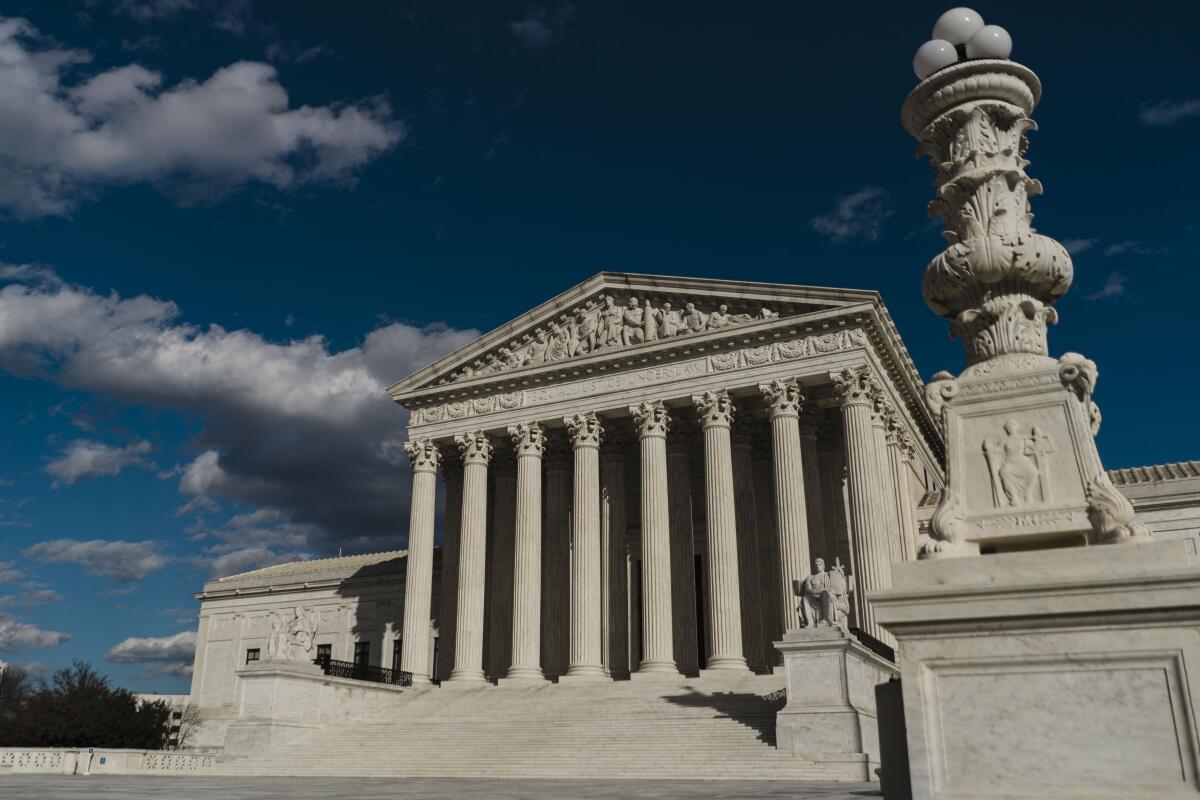Supreme Court says Illinois may ban sale of rapid-fire assault weapons for now

- Share via
WASHINGTON — The Supreme Court on Wednesday turned down a 2nd Amendment appeal from gun owners and let stand for now an Illinois law banning the sale of the rapid-fire assault weapons that have been used to carry out mass shootings across the country.
In an unsigned order with no dissents, the justices rejected an emergency appeal that asked them to block a local ordinance and the state ban from taking
effect.
While the court’s action is not a ruling on the broader constitutional issue, it is a good sign for California and the eight other states that also ban the sale of assault weapons.
Justices usually agree to block a new law from taking effect if they believe it is unconstitutional.
The case before the high court was the National Assn. for Gun Rights vs. Naperville, Ill.
The 7th Circuit Court of Appeals in Chicago has said it will hear arguments on the constitutional issue in late June, and the justices may have decided to wait for that ruling.
The high court has not ruled directly on whether an AR-15-style rifle is protected by the 2nd Amendment. In the past, it turned away 2nd Amendment challenges to similar state and local laws.
But last year, gun rights advocates were cheered when the more conservative court struck down laws in New York and elsewhere that restricted many law-abiding gun owners from carrying a concealed weapon in public. Writing for a 6-3 majority, Justice Clarence Thomas said gun restrictions can be upheld only if they are “consistent with the nation’s historical tradition of firearms regulation.”
Less than two weeks after that ruling was announced, a shooter armed with a semiautomatic AR-15 rifle and 30-round magazines opened fire on an Independence Day parade in Highland Park, Ill. The weapon allowed the shooter to fire 83 rounds in less than a minute, killing seven and wounding 48.
In response, the city of Naperville and the state of Illinois adopted new laws to forbid the sale and possession of assault weapons and high-capacity magazines. Only the sale ban was due to take effect immediately.
A gun store owner and several gun rights groups sued to block the measures as violations of the 2nd Amendment.
Gun rights advocates argued that millions of AR-15s have been sold in this country and that the 2nd Amendment has been understood to protect firearms that are in “common use.”
But today’s lightweight semiautomatic weapons are quite unlike the heavy, cumbersome muskets that were in use in 1791. In defense of the ban, the state’s lawyers argued that the rapid-fire rifles “were developed and marketed as military-style offensive weapons,” not “as a means for self-defense.”
A federal judge agreed and allowed Naperville’s ban to take effect.
“The history of firearms regulation establishes that governments enjoy the ability to regulate highly dangerous arms,” said U.S. District Judge Virginia M. Kendall, and “assault weapons and large-capacity magazines fall under this category.”
The 7th Circuit Court refused to block the two laws from taking effect while it considered the gun groups’ appeal.
More to Read
Get the L.A. Times Politics newsletter
Deeply reported insights into legislation, politics and policy from Sacramento, Washington and beyond. In your inbox twice per week.
You may occasionally receive promotional content from the Los Angeles Times.









